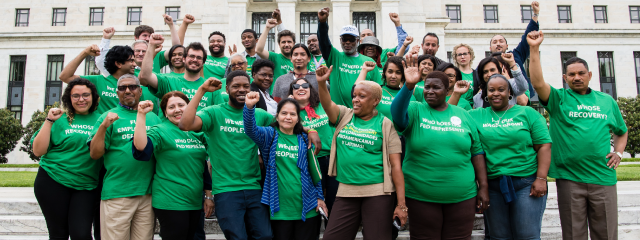Blog
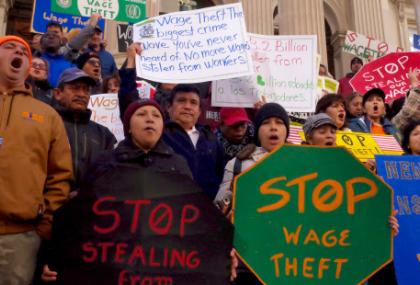
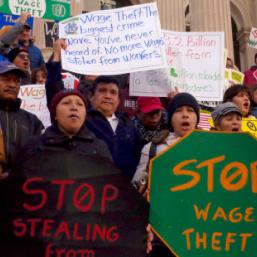
After years of Make the Road NJ’s organizing, the New Jersey State legislature passed landmark anti-wage theft legislation (A-2903/S-1790) on June 27. Once signed into law, New Jersey’s wage and hour protections will be among the strongest in the country and will protect thousands of workers against theft of their minimum and overtime wages. This victory comes on the heels of New Jersey’s phased-in $15 minimum wage hike that kicked in on July 1. Anti-wage theft legislation will help ensure that all workers are paid for their work.
Highlights of the legislation include:
-
Increased damages and six-year statute of limitations: Workers who experience wage theft will now be able to collect up to 200% in liquidated damages. Workers can now collect unpaid wages for up to six years (up from two years). Employers that fail to pay up on wage violations will be at risk of losing their business licenses in the state.
-
Joint liability: Employers who subcontract out to firms that steal from their workers will be held jointly liable, making it harder for companies to evade liability.
-
Strong anti-retaliation provisions: The legislation significantly strengthens anti-retaliation provisions, protecting workers from being fired for speaking out about unpaid wages. Click here to learn about MRNJ member Felix L., who complained about being paid below the minimum wage and was left at an Immigration and Customs Enforcement (ICE) detention center by his employer in retaliation. This legislation will put a stop to such practices.
New Jersey has long lagged behind in wage and hour protections for workers. A report released just days prior by the National Employment Law Project placed New Jersey in the lowest or “third tier” in terms of enforcement protections against wage theft. This legislation will now place the state at the top of the list.
This victory was the result of years of hard work of low wage workers from across New Jersey, including the members of CPD affiliate Make the Road NJ (MRNJ). We thank THEIR partners New Labor, SEIU 32BJ, NJ Working Families Alliance, National Employment Law Project, Wind of the Spirit and many more for joining in this fight. We thank sponsors Assemblywoman Annette Quijano and State Senator Loretta Weinberg for their tireless leadership. This marks a historic victory for low-wage workers in New Jersey. Congratulations MRNJ!
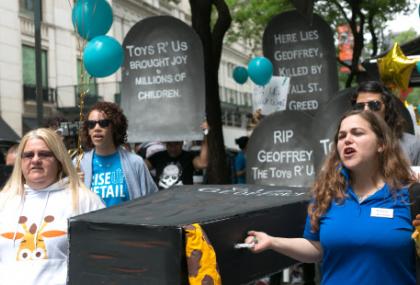
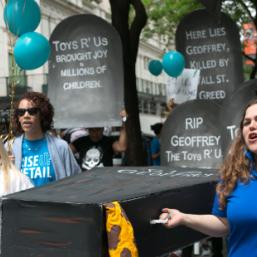
This month, CPD released Pirate Equity: How Wall Street Firms are Pillaging American Retail, a report that details how Wall Street firms have been driving economic inequality in our country for decades. As we’ve seen time and time again, Wall Street private equity and hedge fund managers load companies with debt, sell the best assets for personal gain, and leave hundreds of thousands of working people behind.
Huge swaths of the retail sector, media companies, grocery stores, nursing homes and hundreds of thousands of our homes and apartments have all come under the control of Wall Street predators, bringing disaster to communities across the country. Millions more people who depend on fair and functioning markets, including investors, pensioners, and small businesses lose out. Women and people of color make up many of the victims of these practices. It’s a massive extraction of wealth from millions of Americans, all to make Wall Street billionaires even richer.
Released in conjunction with the Stop Wall Street Looting Act that was introduced to the House and Senate this month, the publication was created in partnership with United for Respect, Americans for Financial Reform Education Fund, Strong Economy for All Coalition, Hedgeclippers, and the Private Equity Stakeholder Project. The report made headlines in by NPR Weekend Edition Saturday, Bloomberg (and Bloomberg Radio), Vox, The Washington Post, Forbes, and more.
The Stop Wall Street Looting Act is meant to crack down on private equity and hedge funds to protect our jobs, our housing, and our communities. The legislation will:
-
Hold predatory private equity firms and hedge funds liable for the damage they cause
-
Ban key mechanisms of wealth extraction, like dividends (for a period after acquisition) and private equity management fees
-
Limit the amount of debt that these profiteers can access for seizing control of companies and require lenders to retain some of the risk those companies inevitably face
-
Close tax loopholes that encourage excessive debt and that let executives avoid paying their fair share of taxes
-
Protect workers when employers go bankrupt, and that let courts go after the wealth of private equity executives
-
Require private equity firms to be transparent with pension funds about the risks of investing in companies they have acquired
CPD’s Wall Street Accountability campaign worked with our allies at United for Respect—including thousands of former Toys “R” Us and Sears andKmart workers whose jobs and benefits were taken by private equity managers—and Americans for Financial Reform over the past year to develop policies that would stop the worst predatory practices on Wall Street and start holding billionaires accountable for the damage they’re doing to our communities and our economy.
We’ll be working over the next year with CPD affiliates and lead sponsors like U.S. Senators Elizabeth Warren and Bernie Sanders and U.S. Representatives Pramila Jayapal and Mark Pocan to build public understanding and support for this effort, with new exposés on private equity abuses and more direct action protests targeting the bad billionaires.

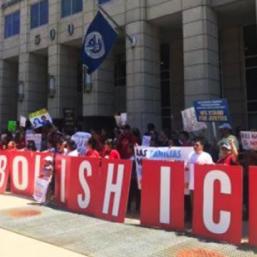
Over the months of June and July, CPD and our affiliates have responded to the Trump administration’s deportation threats against immigrant communities. The CPD Network continues to work to educate and mobilize our members to fight back and hold the corporations enabling this hateful agenda accountable for their actions. To prepare for the incoming wave of ICE raids and activity, our affiliates from Make the Road Nevada, Action NC, Sunflower Community Action, Make the Road New York, and UNÉ, along with others brought members together for know-your-rights workshops. During the first week of July, the CPD Network also joined #ClosetheCamps actions all over the nation and Make the Road New Jersey occupied Congressional offices across that state.
Shortly after, CPA affiliate CASA took to the streets on July 5 to protest the proposed raids by the Trump administration. Over the next two weeks, CPD worked with Make the Road NJ to bring Yazmin Suarez the mother of Mariee, a toddler who died in a private detention center, to a congressional hearing on Kids in Cages. Yazmin offered powerful testimony and helped bring awareness to the abuses occurring in detention centers. That same week, the powerful testimony was followed by eight CPD affiliates joining more than 800 other activists to lead 20 Lights for Liberty vigils all over the world in protest against the conditions on the U.S.-Mexico border.
At the same time, CPD and the Corporate Backers of Hate Campaign continued to fight against immigrant detention on a different front, holding the banks that profit from the Trump administration hateful agenda through private detention centers accountable for their investments. Through continued pressure, internal conversations, and an ongoing collaboration with the Families Belong Together Campaign, we successfully forced BNP Paribas Bank, SunTrust, Bank of America and Fifth Third Bank to join Chase Bank and Wells Fargo to stop financing detention centers. In doing so, the campaign has been able to pressure five major banks to stop doing business with GEO Group and CoreCivic, making it more difficult for these companies to have the financing they need to run private detention centers that cage our communities.
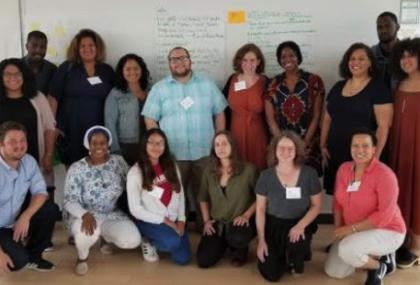
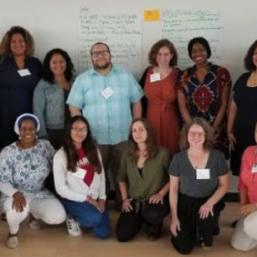
In June 2018 at CPD CAMP, the Center for Popular Democracy launched a year-long cohort of emerging organizational leaders, new executive directors, and senior staff whose mission was to envision and ensure the strong implementation of robust organizing programs. Hailing from 16 organizations across our network, these bold new leaders dug into their leadership practices, learning how to cultivate strong and supportive workplace cultures, deepening supervision and management commitments, and setting ambitious goals for themselves, as well as for their organizations and communities.
This coordinated effort helped them to articulate shared theories and practices for a stronger movement ecosystem. This intermovement work and visioning is central to the goals of the CPD Network as we try to generate progressive futures that span diverse social justice causes. The group convened again in New York City this month.
Leo Murrietta, Executive Director of Make the Road Nevada wrote, “I'm so thankful to be able to participate in this group of beautiful people who are trying to steer their ships while they're building them just like I am.”
Angela Lang, Executive Director of BLOC said, “Through emerging leaders, I leaned in to my role as a new executive director and figured out how to be most effective and intentional in my leadership style to take my organization to the next level.”
This group created a generative and rich learning environment fueled by their appreciation for and curiosity about each other and their work. Through informal accountability, relational ties, and peer coaching, these leaders tightened the texture of our network and forged deep bonds amongst themselves across their disciplines. The relationships built and lessons learned between members of the cohort constitute that invaluable time that no amount of programming can properly account for, generating an environment that is critical to the intersectional work of our movement.
As leaders, we recognize the tremendous moment we are in, one in which our communities are actively working to reshape the world around us. We aim to do so not only through big campaigns, but also through empowering the development of the individuals who make up our network: our member and staff leaders. We are invested in their growth, as well as in their ability to remain accountable and visionary in the face of the tremendous work ahead. Emerging Leaders provided—and will continue to provide—a space for leaders to invest in their own development and strengthen their capacity to lead the durable engines for social justice our communities all desperately need. CPD will launch our next cycle of Emerging Leaders in the fall. Look for information later this summer—we hope to see your leaders there!
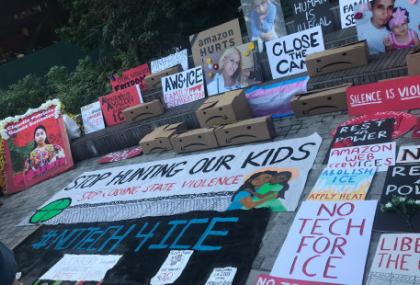
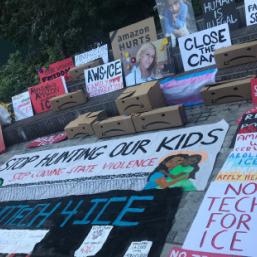
July shaped up to be a pivotal moment for the anti-Amazon campaign, demonstrating the intersectional issues and diverse power at the center of the CPD Network. Last month brought together several threads of the work, particularly, the campaign against corporate backers of hate who empower ICE deportations and surveillance with federal oversight on antitrust laws.
CPD affiliates Make the Road New York, New York Communities for Change, and Make the Road New Jersey organized a series of actions to coincide with key Amazon-related events. The protests come as ICE continues to raid and terrorize communities across the country, trap migrant children in inhumane environments at the border, and rip families apart—a humanitarian crisis that Amazon has directly helped fuel, and one it threatens to exacerbate with continued marketing of its facial recognition software to ICE officials.
On July 11, as Amazon Web Services held its annual summit, immigrant rights groups, tech workers, and Amazon warehouse workers rallied in the streets outside of the Javits Center to demand that Amazon end its relationship with the U.S. Immigration and Customs Enforcement agency. The demonstrators, led by a growing coalition of organizations (including Make the Road NY, New York Communities for Change, Mijente, ALIGN, Tech Workers Coalition and others) demanded that Amazon Web Services—which serves as the Department of Homeland Security’s’s database for immigration case management systems—stop providing its cloud computing software to DHS that allows the agency to store biometric data on 230 million people, including fingerprints, face, and iris records.
On July 14, immigrant members of Make the Road NJ—including families who have been detained by ICE—echoed the calls for Amazon to end its partnership with ICE and close any federal contracts that support the administration’s anti-immigrant agenda. “In a moment when the federal government is caging children in horrendous conditions, Amazon provides key technology and data infrastructure to fuel the Trump administration’s deportation machine and bolstering the work of ICE. It’s time for that to end!” said Sara Cullinane, Executive Director of Make the Road NJ.
On July 15, the start of Amazon’s two-day Prime Day event, a large coalition of community, immigration, and labor groups occupied the lobby of Jeff Bezos’ new $80 million dollar Manhattan home to deliver 250,000 petitions calling on Amazon to cut ties with ICE and end abusive working conditions in its warehouses. Led by New York Communities for Change and others, the rally was one of several coordinated actions taking place across the country—including in Minneapolis, Portland, Seattle, San Francisco, Arlington, and Washington D.C.—building on a collective grassroots energy working to hold the corporation accountable.
These nationwide actions set the tone looking forward as the Federal Trade Commission’s starts its investigation of Amazon. Progressive groups are prepared to mobilize around antitrust efforts against the all-too-powerful monopolies and corporations that undermine U.S. democracy, starting with the House Antitrust Subcommittee hearing on July 16. Check out #AmazonvsImmigrants, #BackersofHate, #NoTech4ICE on Twitter for more pictures, videos, updates and news from those leading the fight.
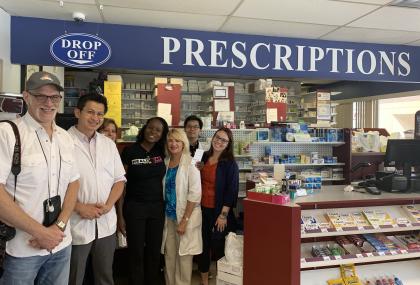
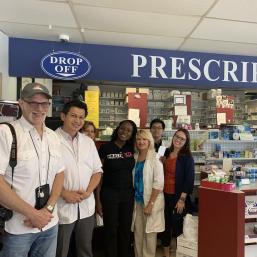
On Thursday, July 25, a group of healthcare activists traveled from Detroit, MI across the border to nearby Windsor, Canada to refill their prescriptions, which cost them nearly ten times as much in the US.
The pilgrimage - led by CPD Director of Action Management Julia Peter - sought to raise awareness and criticize the obscene cost of prescription drugs in America, ahead of a House Oversight Committee hearing on the issue held on July 26.
Jamila Headley, the managing director of Health GAP (Global Access Project) and one of the trip participants, was blown away when she found out that Lyrica - the drug she takes to treat chronic pain that is the result of an autoimmune illness that left her suddenly paralyzed from the waist down 12 years ago - only costs US$35 for a one month supply in Canada. It costs US$852.74 in the States.
Activist and photographer, TW Collins, described a similar shock about the cost of his NovoLog insulin pen. “For a month’s supply of my insulin, which is a box of five pens, it costs $675. Before this trip, I was under the impression that an individual pen cost US$82 each in Canada -- which is already over a 50% savings. But when we actually picked up the prescription at the pharmacy, I learned it’s actually the ENTIRE box of five pens for US82!”
In total, the ten-minute ride from Detroit to Windsor would have saved the group $1410.72 on the prescriptions medicines they need to survive.
“These drugs are a public good. So why do Americans pay more per drug than the fifteen other richest countries in the world? There is absolutely no reason that a drug should cost 10 times more in the US than it does anywhere else,” said Jennifer Flynn Walker, Senior Director of Mobilization and Advocacy at the Center for Popular Democracy.
The bus trip took place in the backdrop of CPD’s People’s Convention, a national convening with over 1500 affiliate members in attendance. Headly and Collins joined activists on stage during a massive action in downtown Detroit to share their stories and call for Congressional action on drug pricing.
“People are dying because they can’t afford the medicines they need to live! All because of the greed of pharmaceutical companies and the lack of federal action against their deadly pricing practices!”
*Editor's Note: Headley was not able to fill a prescription for Lyrica during this trip but was given the pricing from the pharmacist.
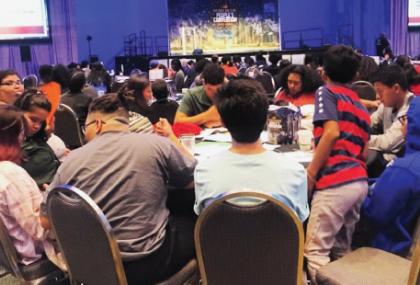

As an end to the People's Convention youth track, the convention launched its very first youth workshop. This event not only gathered around 200 YERR members, but the programming goals were planned by youth! Jeremiah, a member of Make the Road New York, when referring to youth being able to come together in this way stated: “Bringing a bunch of people together for a cause is very powerful, it’s inspiring, it’s a beautiful sight.”
We began by analyzing three different forms of oppression in our communities: capitalism, white supremacy, and patriarchy. We discussed neoliberalism and how we can use people power to reverse the effects of it in our society.
With this grounding on the overarching issues that are detrimental to our communities, we moved into the second half of the workshop where we discussed ways to combat these issues. This kicked off the current year-long process of ratifying the Youth Power Platform which outlines the goals for YERR moving forward. The Youth Power Platform was drafted by a youth committee in the months leading up to the convention and reviewed by YERR leadership before the convening. During the workshop, each of the organizations could vote on whether or not they agreed, disagreed, or had suggestions with each of the tenants in the document.
We ended the day by agreeing that the way to achieve our vision is by building a mass youth movement. Young people practiced their outreach conversation so they could talk with their friends, peers, and community members about joining the movement. Urban Youth Collaborative led this session and included a skit of how to have these conversations. Onyx Walker, a youth leader for the organization described the process of developing the skit and what it was meant to project: “Our process was making it as realistic and relatable as possible while also not making it feel like a set-up.” Youth were able to visualize the massive network they wanted to build with a “Network Tree” activity in which they listed all the people they could reach out to. This activity was created by Make the Road CT. Devene from Make the Road Nevada reflected on this experience: “The part of the youth power workshop with the network tree helped me realize that every single one of us could reach out to our friends and family that we may not have thought had any interest in activism like we do and really make connections.” Each young person committed to reaching out to ten people to grow the movement.
The day ended with celebrator chant and picture!
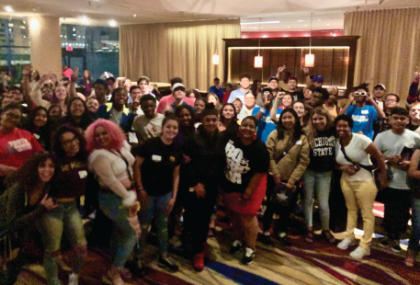
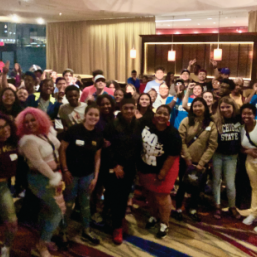
To kickoff the People’s Convention, youth participants first came together in a welcome room led by Davonte Johnson (Tae) from Detroit Action. Everyone shared what kept them going in the face of adversity and why they were inspired to be at the convention. Then the youth participated in a privilege walk, lifting up the voices of those less privileged by placing them in the middle, rather than the outskirts. They talked about how those most impacted by injustices should be the ones leading the fight for justice.
Tae, reflected that, “the most impactful part of the convention for me was the welcome night and the welcome room. We were able to help facilitate breaking down the walls and barriers that people have just coming from around the country to get to know people, and being able to witness so much transparency and authenticity inside the room was beautiful… I wanted to leave people with a family atmosphere, and I think we accomplished that. It was like we all knew each other for years.”
After dinner, we officially kicked off the youth track with a celebration in a room overlooking the Detroit River. While music played, the youth mingled and had snacks. Young people from Detroit Action welcomed everyone who had just travelled across the country to be together. We were even surprised with a special performance by Lah Tere!
During the welcome reception, we also debuted the new YERR Logo! Crystal Aguierre from Make the Road Connecticut (MTRCT) and Fiona Joseph from Make the Road New Jersey (MTRNJ) made up the SWAG committee that brainstormed the logo and swag for young people at the convention. Fiona said, “We really got to thinking what symbolizes us as YERR as a whole and the things that connected us. We are all young people, we all believe in causes for a more progressive future, and we have such diverse identities.” After a lot of brainstorming, the committee decided on different symbols that were important to YERR. Crystal explained that “the multicolored flag in the back symbolizes pride in a lot of our communities. It represents that we all stand together no matter our sexual orientation, our gender, our skin color. We have the power fist because we all fight together.”
After the celebratory welcome, we broke off into groups to discuss the various leadership roles young people would take on during the convention, including being photographers, a social media team, chant committees, and more!
The night ended with button decorating, chant practice, sign making, and great conversation.
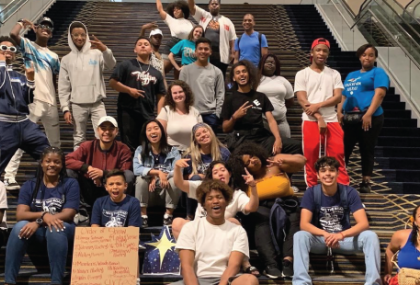
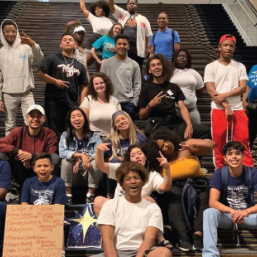
Youth had the opportunity to showcase their many talents in dance, rap, poetry, singing and other engaging performances. This was a completely youth led space with youth MCs and performers. Many of the pieces performed relayed an activist sentiment, very fitting for the People’s Convention. Not only were the performances entertaining for the audience but many performers expressed an appreciation for being able to perform in such a welcoming and accepting environment filled with friends who could relate to their backgrounds.
Onyx Walker, a leader at the Urban Youth Collaborative in New York, who was both an MC and performer during the event stated that “it was one of the most supportive, creative spaces” he’d ever been in. Onyx went on to describe a specific performance by Vinny, a member of Latinos Unidos Siempre (LUS), at the end of the night which showed the accepting environment: “Folks were one hundred percent supportive, heard him out...and a lot of people felt what he had to say.” Some performers like Jeremiah from Make the Road New York expressed similar feelings: “I was scared because it was my first time performing...the environment, it made me feel comfortable.” As the night ended youth had created community through shared support and creativity which proved to be necessary in the following day of workshops where they successfully worked together to create heir vision for their communities.
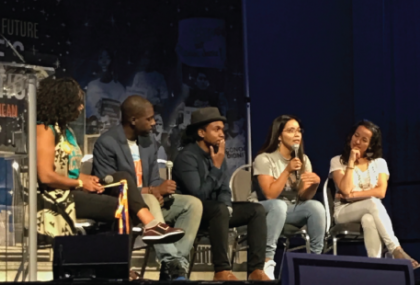
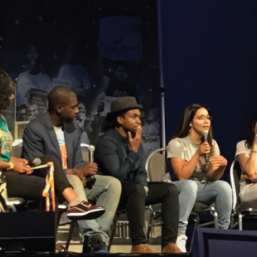
Young people were represented during all of the major moments throughout the convention including during the opening plenary, throughout the federal agenda ratification process, asking questions of leading political figures, at the rally, and more.
The convention kicked off with an opening plenary with leadership from our network. Cendi Trujillo Tena, the Organizing Director of Leaders Igniting Transformation (LIT) a youth of color organization, joined the plenary to discuss the importance of building youth power across the network. She was joined by CPDA’s Co-Executive Directors Jen Epps-Addison, Ana Maria Archila, Working Families Party’s National Director, Maurice Mitchell, and Detroit Action’s Executive Director, Branden Snyder.
A central aspect of the People’s Convention was a collective process to review and ratify CPDA’s Federal Platform. Throughout the presentation of the federal platform members of the network spoke powerfully about the importance of fighting for the variety of issues covered on the platform. Gennesy Jimenez a youth member at Make the Road New Jersey, shared the powerful work she has been doing with other young people in NJ to fight for teen workers. She shared her own experiences as a teen worker and all the ways young people are fighting back. The federal platform passed the network unanimously.
Members of YERR also had the opportunity to ask Senator Sanders, Senator Warren, and Secretary Castro questions about voting rights and accessibility, adequate and affordable housing, and the school-to-prison-pipeline. The questions youth asked allowed other attendees of the People’s Convention to consider how different candidates’s policies could improve their lives and impact the policies for which they are fighting.
Nia Arrington from OnePA asked Senator Sanders about the school-to-prison pipeline. She shared that police in schools made her, and young people in her community, less safe: “At the end of the day, we are young people. The way that we are being dealt with by police in our schools, because of our race, is dehumanizing, stressful, and takes us away from the pathway that we need to thrive.” She asked that the Senator end the federal COPS program, which has funneled more than a billion dollars into schools, mainly to add police and infrastructure like metal detectors. The Senator committed to meet with young people across the country to discuss the school-to-prison pipeline.
Blanca Callazo, a member of LUCHA, asked Julian Castro questions regarding his plans to protect and expand voting rights to youth, immigrants, people of color and those impacted by the criminal justice system. After asking these questions, Blanca reflected, “I felt as though I got to know more about Julian Castro, his beliefs and the beliefs of others who were asked questions.” This event also allowed the youth to feel empowered. It gave them a chance to voice their concerns and have their voices be heard. Blanca shared, “This event definitely gave me confidence, it also challenged me as an individual to do things I could have never imagined myself doing, especially as we are approaching the year of 2020. I also want to highlight that my team saw me step up in my leadership and that inspired them to also step up their leadership as well and participate in the activities.”



